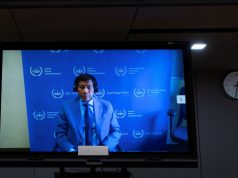MANILA, Philippines — (UPDATE 3 – 11:27 p.m.) President Rodrigo Duterte signed into law the bill granting free tuition in state universities and colleges.
This was announced Friday morning by Senior Deputy Executive Secretary Menardo Guevarra at a press briefing.
He said Duterte signed the Universal Access to Quality Tertiary Education Act Thursday evening, August 3.
The measure, which makes tuition and other fees in SUCs free, was ratified by Congress in late May.
Government economic managers had urged Duterte to veto the measure, claiming government could not afford what they said was the P100-billion annual requirement to fund its implementation. However, lawmakers refuted this, saying the law would only need P25 billion a year.
Had Duterte not signed the bill, it would have lapsed into law on Saturday.
Reactions
Reacting to the news, Senator Paolo Benigno Aquino IV, principal sponsor of the measure in the Senate, thanked Duterte but said “millions of Filipinos are the real winners with this revolutionary education reform.”
At the same time, Aquino said Senato Loren Legarda, who chairs the committee on finance, had “already committed to including free tuition in the 2018 budget.”
“This is an important milestone in ensuring that we provide sufficient support developing our human capital. Our people are our greatest asset that’s why the biggest investment of the government should go to them,” Senator Joel Villanueva said.
For his part, Renato Reyes Jr., secretary general of the Bagong Alyansang Makabayan welcomed the new law.
“It is about time,” he said. “For so long public college education suffered from lack of governed subsidy and excessive school fees.”
“We look forward to the law’s full implementation,” he added.
He also called the new law a “stinging rebuke” to Finance Secretary Carlos Dominguez, Budget Secretary Benjamin Diokno and Socio-Economic Planning Secretary Ernesto Pernia, who both advocated rejection of the measure.
At the same time, congratulating “the youth who fought hard for this measure,” Reyes challenged them to “us this great opportunity not just to learn but to change the world.”
In the House of Representatives, lawmakers hailed the signing of the new law and also vowed to find funds for it in the 2018 national budget.
“The law is laudable because it does not only address the needs of students in public colleges and universities, but also the needs of underprivileged students who would fail to make cut in our state colleges and universities,” Pampanga Representative Gloria Macapagal-Arroyo said.
“The passage of the Free Tuition Law is an initial victory not only for the youth today but also for future generations,” Kabataan party-list Representative Sarah Elago said even as she urged continued vigilance against limitations that may be inserted into the law’s implementing rules and regulations.
“Also, Congress has to address the fact that our economic managers excluded any type of funding for this significant legislation in the 2018 proposed national budget,” she added.
Welcoming the law, Bayan Muna Representative Carlos Zarate also admitted “the victory of the people though is yet to be completed and we are now calling on leaders and members of Congress to immediately set a budget for the measure so that the youth and students of our country would now benefit from it.”
“We are also calling on the administration of state colleges and universities especially UP (University of the Philippines) to now stop collecting tuition and allow their students to enroll because the funds are already allotted for that purpose,” Zarate added.
ACT Teachers Represetative Antonio Tinio urged Malacañang and Congress to work together to ensure funding for the law.
“Since the House deliberation on the 2018 national budget is still in the preliminary stage, we call on the executive (branch), through the DBM, to submit a revised budget that provides for the initial implementation of the new law,” he said.
Anakpawis Representative Ariel Casilao lauded Duterte and called the new law “an opportunity to youth nationwide, especially among ranks of peasant, indigenous people and urban poor to continue their education.”
Kabayan Representative Harry Roque said the Department of Education has been hounded yearly with the problem of underspending its allocated budget, because of which “it is also a bit proper” to “allocate funds for college education for our youth.”
Ako Bicol Representative Rodel Batocabe said “finishing college is no longer a pipe dream for most of our young and their families” with the new law while ACTS OFW Representative John Bertiz said it would “prepare and equip the next generation of Filipinos.”
“It will also enable us to pull abreast in the fast pace of technology and highly competitive world market,” he added.
Akbayan Representative Tom Villarin called the law’s enactment “a victory for the youth and students who have relentlessly fought for the right to free education over the years.”
But, he added, this did not make Duterte “a role model for the youth. It does not exculpate him from his wrongful acts of promoting a culture of violence, mass murder, and misogyny. The youth should continue to unmask his double-face populist posturing.”
“As one of the principal authors in the House of said bill, I hope that the future leaders of this country may also inspire courage and empathy for the poor especially in these extraordinary times,” Villarin added.
Click and watch this video report:










